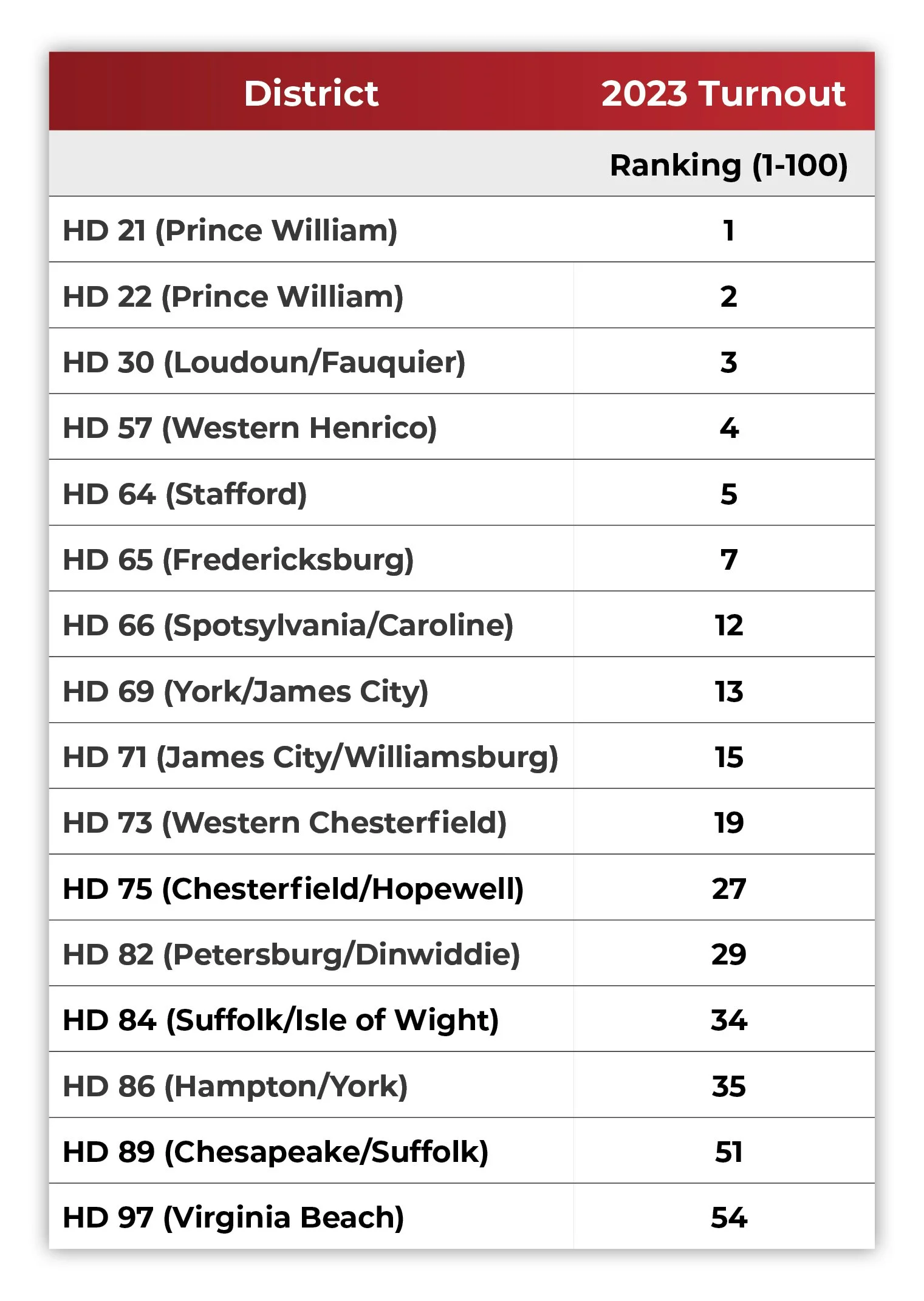EXCLUSIVE: Early Turnout is Surging in Virginia. What Does That Mean for the GOP?
by Hayden Ludwig
Gleaning insights from the tea leaves about this year's most important election.
Early voting in Virginia's fiercely contested November election is already running nearly double the pace of the 2021 governor's race, a potential gift for Republicans according to new analysis by Restoration News.
More than 389,000 early ballots have been cast so far—an 85% increase over 2021 and 122% over 2023, when the House of Delegates was last up for election.
With less than a month until Election Day, early voting may ultimately top 2.2 million, nearly twice the 1.2 million early ballots cast four years ago. Of those ballots, 65% were cast in-person versus just 35% by mail. That should encourage Republicans facing an uphill battle to retain control of the governor's mansion and retake the House of Delegates.
Virginia has elections every year, offering insights into evolving voting trends. Democrats have dominated absentee voting in the past five elections—topping 69% in 2020—while Republicans have comfortably won Election Day turnout. In-person early voting is a different story; while Democrats easily won the in-person early vote between 2020 and 2023, Republicans narrowly edged them out in the 2024 presidential election, winning 46.5–45.5%.
That's a huge warning sign for Democrats in this blue-leaning purple state, because Republicans don't have to beat Democrats at early voting—they only need to keep it competitive.
As I've pointed out, Virginia Democrats won early voting by more than 15 percentage points in the 2023 General Assembly election yet only netted one-seat majorities in the House of Delegates (51–49) and State Senate (21–19).
Their margin was even larger in 2021—nearly 20 points—yet they still narrowly lost all three executive races. Republicans retook seven seats in House of Delegates, cementing a 52–48 majority.
While conservatives undoubtedly face headwinds in 2025, with Virginia voters typically favoring the party not in the White House, there are other reasons to think this early turnout surge gives Republicans a solid chance to buck that trend.
Biden-Youngkin-Harris Districts
Virginia's most closely contested House of Delegates seats are concentrated in Virginia's southeastern tidewater region, the Richmond suburbs, and the exurbs outside deep blue northern Virginia. These are the commonwealth's most densely populated and fastest-growing areas. They're also purple districts where Democrats have an advantage, but moderates can swing elections toward Republicans under the right conditions.
The most competitive House of Delegates races in 2025
Both Kamala Harris and Joe Biden dominated these regions' swing counties in the past two presidential elections. Democrats have steadily increased their vote share here since 2016 in places such as Chesterfield, central Virginia's most populous county; Stafford, a military-heavy county outside Fredericksburg; and Virginia Beach, the state's largest city.
Glenn Youngkin won all three by convincing margins in the 2021 governor's race against Democrat Terry McAuliffe, who lost the election by 63,000 votes or just under two percentage points.
Two of those regions, the Tidewater and northern Virginia exurbs, were also the focus of the fiercest battles for control of the House of Delegates in 2021 and 2023—when Republicans narrowly flipped the legislature and Democrats barely flipped it back, respectively.
The Hottest House Races
Restoration News examined the 16 most competitive legislative races up this year, which the Virginia Public Access Project (VPAP) rates between R+7.9 and D+8.2.
These districts include six of the top 10 seats with the most ballots cast—including early votes—in 2023.
Five of them (HD 21, 22, 30, 57, and 64) also saw the highest turnout of any House races that year.
The average margin of victory across all 16 was 5.7 percentage points, though a handful were decided by two points or less.
The Biden-Youngkin-Harris dynamic typical of Virginia's swing counties is also evident here. VPAP ranks 10 of these 16 seats as Republican-leaning in 2025. However, just four voted for Donald Trump in the 2024 presidential election—whereas all but one backed Glenn Youngkin in the 2021 governor's race. (We can't compare prior gubernatorial elections because the House map changed significantly after the 2021 redistricting process.)
Amazingly, just one seat—HD 84 covering Suffolk and Isle of Wight Counties—broke for both McAuliffe and Harris by 14 points. Yet the delegate holding that seat, Nadarius Clark (D), only won election in 2023 by 6.2 points.
What does that mean for statewide Republicans? These are districts where it's crucial to drive strong voter turnout, especially early in-person turnout, among swing voters who are easily turned off by radical Democrats' tolerance of crime, devotion to "transitioning" children, and electoral scandals—think McAuliffe's anti-parent blunder or Jay Jones' homicidal text messages.
It's also where the Right's burgeoning permanent campaign model will shine brightest.
I've detailed how American Majority Action—led by Virginia's own Ned Ryun—and other groups are building a powerful voter activation machine designed to chase Republican voters 'til they return their ballots. Investing in campaign infrastructure working year-in, year-out is a better way to create high-propensity, reliable voters than costly, last-minute attack ads. American Majority proved that with Trump's victory in Wisconsin last year, when he cut Harris' early vote lead by two-thirds compared with 2020 turnout and took the state by 29,000 votes, while Republicans won in-person early voting for the first time ever.
The lesson holds true in Virginia: Republicans don't need to beat Democrats at early and Election Day voting—we just need to cut their early voting lead to come out on top.
Virginia certainly leans blue in state races. Yet the parties' evolving demographics mean that for the first time in generations Republicans, not Democrats, now perform better in high turnout elections. Republicans won 14 of the 25 House races with the highest turnout in 2023, including the top two. The more investment we make into permanent campaign infrastructure, the more we'll be able to take decisive advantage of the conservative-populist moment.
Image credit: Virginia Public Access Project
The battle for control of Virginia will be decided over decades, not single elections. Democrats enjoyed an unbroken majority in the House of Delegates for 114 years, from 1884 to 1998, until Republicans shattered it during Bill Clinton's second scandal-ridden term. Democrats have since benefited from the federal government's dramatic growth, particularly the national security apparatus concentrated in northern Virginia in the wake of 9/11. That includes ex-CIA officer Abigail Spanberger, the first to ever seek executive office.
Yet even with all the Democrats' advantages, Virginia's future is still up for grabs if conservatives will put in the resources and hard work to win.
Hayden Ludwig is Founder and Managing Editor of Restoration News, launched in 2023, and Executive Director for Research at Restoration of America. He specializes in election integrity and dark money, authoring the first investigations into the 2020 election "Zuck Bucks" scandal and unearthing the world's largest dark money network run by Arabella Advisors. He publishes regularly at RealClearPolitics, American Greatness, and the American Conservative.
Republished with permission from Restoration News.










